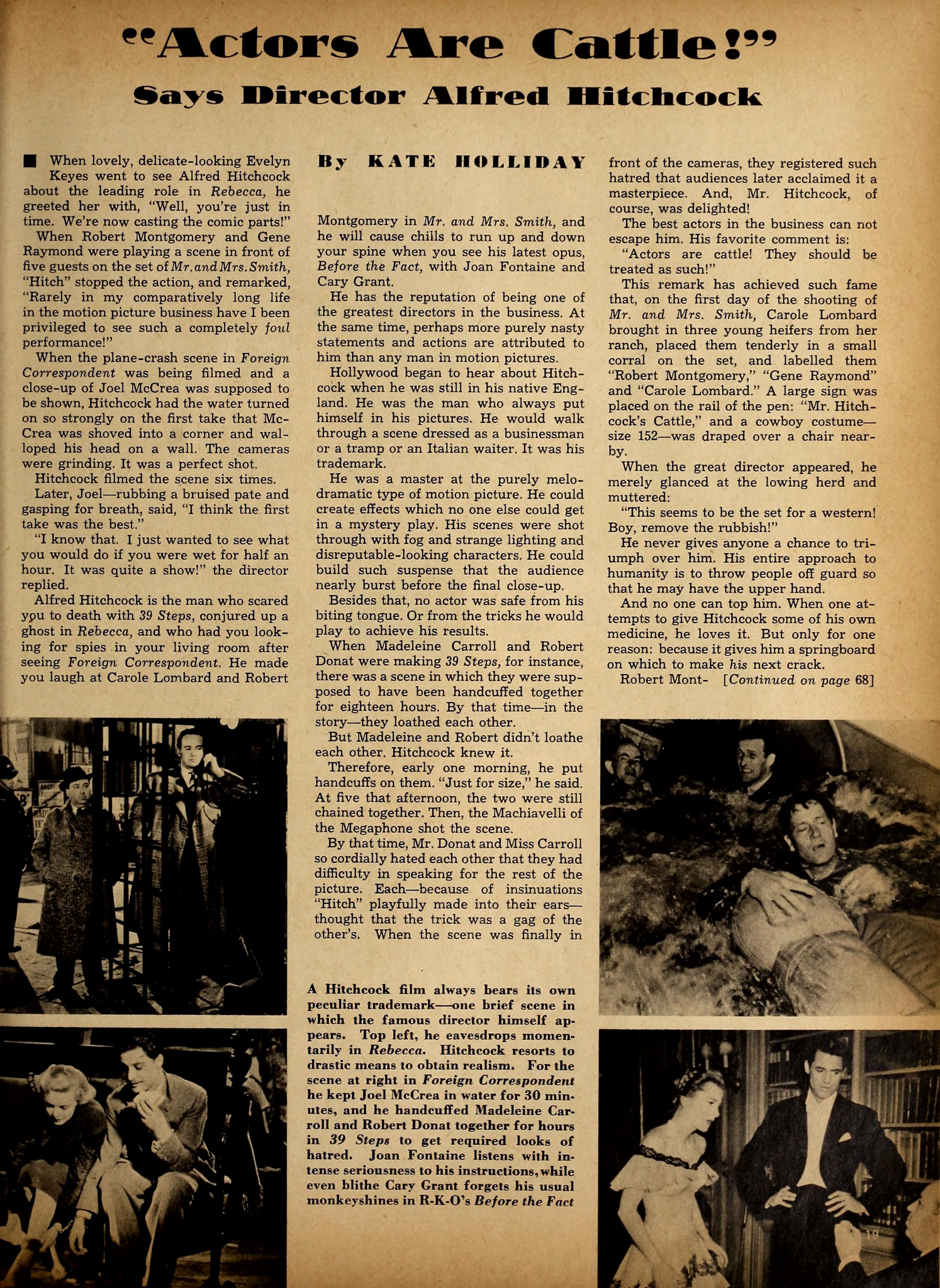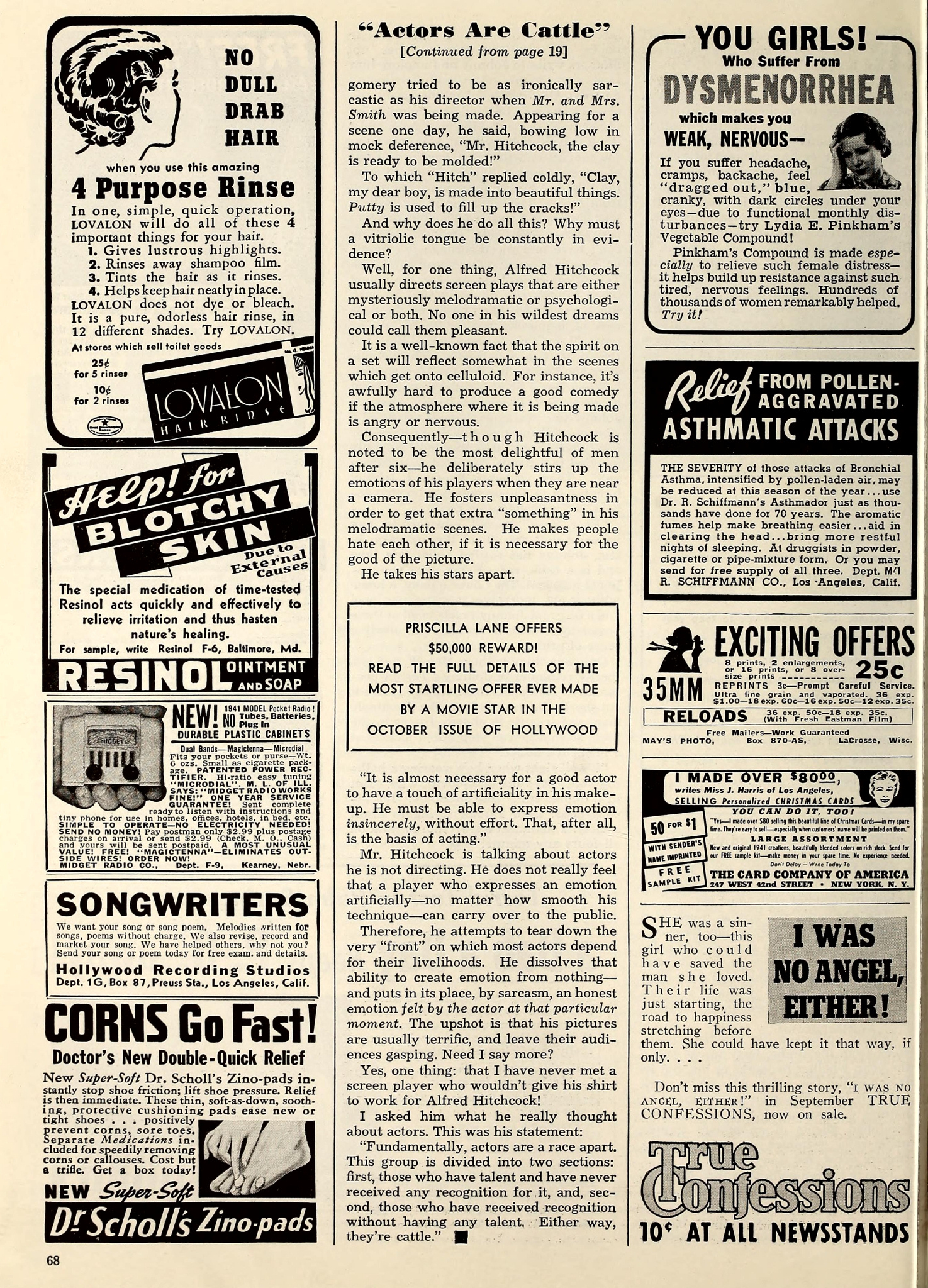Hollywood Magazine (1941) - Alfred Hitchcock says "Actors are Cattle!"
Details
- article: Alfred Hitchcock says "Actors are Cattle!"
- journal: Hollywood Magazine (September 1941)
- issue: volume 30, issue 9, pages 19 & 68
- journal ISSN:
- publisher: Fawcett Publications, Inc.
- keywords: Alfred Hitchcock, Before the Fact (1932) by Francis Iles, Carole Lombard, Cary Grant, Foreign Correspondent (1940), Gene Raymond, Joan Fontaine, Joel McCrea, Madeleine Carroll, Mr. & Mrs. Smith (1941), Rebecca (1940), Robert Donat, Robert Montgomery, Suspicion (1941), The 39 Steps (1935)
Links
Article
Alfred Hitchcock says "Actors are Cattle!"
A Hitchcock film always bears its own peculiar trademark — one brief scene in which the famous director himself appears. Top left, he eavesdrops momentarily in Rebecca. Hitchcock resorts to drastic means to obtain realism. For the scene at right in Foreign Correspondent he kept Joel McCrea in water for 30 minutes, and he handcuffed Madeleine Carroll and Robert Donat together for hours in 39 Steps to get required looks of hatred. Joan Fontaine listens with intense seriousness to his instructions, while even blithe Cary Grant forgets his usual monkeyshines in R-K-O's Before the Fact
When lovely, delicate-looking Evelyn Keyes went to see Alfred Hitchcock about the leading role in Rebecca, he greeted her with, "Well, you're just in time. We're now casting the comic parts!"
When Robert Montgomery and Gene Raymond were playing a scene in front of five guests on the set of Mr. and Mrs. Smith, "Hitch" stopped the action, and remarked, "Rarely in my comparatively long life in the motion picture business have I been privileged to see such a completely foul performance!"
When the plane-crash scene in Foreign Correspondent was being filmed and a close-up of Joel McCrea was supposed to be shown, Hitchcock had the water turned on so strongly on the first take that McCrea was shoved into a corner and walloped his head on a wall. The cameras were grinding. It was a perfect shot.
Hitchcock filmed the scene six times.
Later, Joel — rubbing a bruised pate and gasping for breath, said, "I think the first take was the best."
"I know that. I just wanted to see what you would do if you were wet for half an hour. It was quite a show!" the director replied.
Alfred Hitchcock is the man who scared you to death with 39 Steps, conjured up a ghost in Rebecca, and who had you looking for spies in your living room after seeing Foreign Correspondent. He made you laugh at Carole Lombard and Robert Montgomery in Mr. and Mrs. Smith, and he will cause chills to run up and down your spine when you see his latest opus, Before the Fact, with Joan Fontaine and Cary Grant.
He has the reputation of being one of the greatest directors in the business. At the same time, perhaps more purely nasty statements and actions are attributed to him than any man in motion pictures.
Hollywood began to hear about Hitchcock when he was still in his native England. He was the man who always put himself in his pictures. He would walk through a scene dressed as a businessman or a tramp or an Italian waiter. It was his trademark.
He was a master at the purely melodramatic type of motion picture. He could create effects which no one else could get in a mystery play. His scenes were shot through with fog and strange lighting and disreputable-looking characters. He could build such suspense that the audience nearly burst before the final close-up.
Besides that, no actor was safe from his biting tongue. Or from the tricks he would play to achieve his results.
When Madeleine Carroll and Robert Donat were making 39 Steps, for instance, there was a scene in which they were supposed to have been handcuffed together for eighteen hours. By that time — in the story—they loathed each other.
But Madeleine and Robert didn't loathe each other. Hitchcock knew it.
Therefore, early one morning, he put handcuffs on them. "Just for size," he said. At five that afternoon, the two were still chained together. Then, the Machiavelli of the Megaphone shot the scene.
By that time, Mr. Donat and Miss Carroll so cordially hated each other that they had difficulty in speaking for the rest of the picture. Each — because of insinuations "Hitch" playfully made into their ears — thought that the trick was a gag of the other's. When the scene was finally in front of the cameras, they registered such hatred that audiences later acclaimed it a masterpiece. And, Mr. Hitchcock, of course, was delighted!
The best actors in the business can not escape him. His favorite comment is:
"Actors are cattle! They should be treated as such!"
This remark has achieved such fame that, on the first day of the shooting of Mr. and Mrs. Smith, Carole Lombard brought in three young heifers from her ranch, placed them tenderly in a small corral on the set, and labelled them "Robert Montgomery," "Gene Raymond" and "Carole Lombard." A large sign was placed on the rail of the pen: "Mr. Hitchcock's Cattle," and a cowboy costume — size 152 — was draped over a chair nearby.
When the great director appeared, he merely glanced at the lowing herd and muttered:
"This seems to be the set for a western! Boy, remove the rubbish!"
He never gives anyone a chance to triumph over him. His entire approach to humanity is to throw people off guard so that he may have the upper hand.
And no one can top him. When one attempts to give Hitchcock some of his own medicine, he loves it. But only for one reason: because it gives him a springboard on which to make his next crack.
Robert Montgomery tried to be as ironically sarcastic as his director when Mr. and Mrs. Smith was being made. Appearing for a scene one day, he said, bowing low in mock deference, "Mr. Hitchcock, the clay is ready to be molded!"
To which "Hitch" replied coldly, "Clay, my dear boy, is made into beautiful things. Putty is used to fill up the cracks!"
And why does he do all this? Why must a vitriolic tongue be constantly in evidence?
Well, for one thing, Alfred Hitchcock usually directs screen plays that are either mysteriously melodramatic or psychological or both. No one in his wildest dreams could call them pleasant.
It is a well-known fact that the spirit on a set will reflect somewhat in the scenes which get onto celluloid. For instance, it's awfully hard to produce a good comedy if the atmosphere where it is being made is angry or nervous.
Consequently — though Hitchcock is noted to be the most delightful of men after six — he deliberately stirs up the emotions of his players when they are near a camera. He fosters unpleasantness in order to get that extra "something" in his melodramatic scenes. He makes people hate each other, if it is necessary for the good of the picture.
He takes his stars apart.
"It is almost necessary for a good actor to have a touch of artificiality in his make-up. He must be able to express emotion insincerely, without effort. That, after all, is the basis of acting."
Mr. Hitchcock is talking about actors he is not directing. He does not really feel that a player who expresses an emotion artificially — no matter how smooth his technique — can carry over to the public.
Therefore, he attempts to tear down the very "front" on which most actors depend for their livelihoods. He dissolves that ability to create emotion from nothing — and puts in its place, by sarcasm, an honest emotion felt by the actor at that particular moment. The upshot is that his pictures are usually terrific, and leave their audiences gasping. Need I say more?
Yes, one thing: that I have never met a screen player who wouldn't give his shirt to work for Alfred Hitchcock!
I asked him what he really thought about actors. This was his statement:
"Fundamentally, actors are a race apart. This group is divided into two sections: first, those who have talent and have never received any recognition for it, and, second, those who have received recognition without having any talent. Either way, they're cattle."


